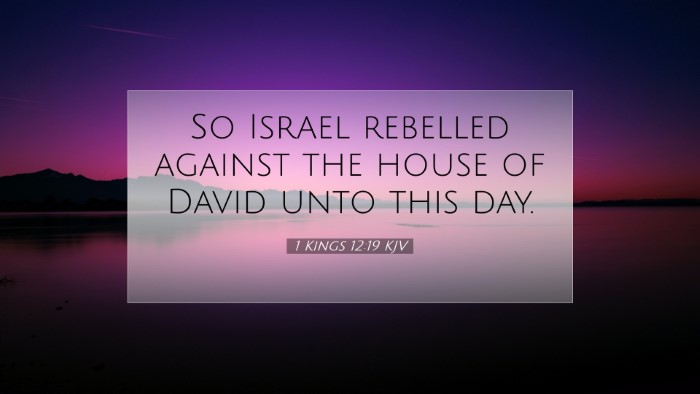Commentary on 1 Kings 12:19
1 Kings 12:19 states, "So Israel rebelled against the house of David unto this day." This verse concludes an important historical and theological moment in the narrative of the monarchy in Israel, marking the division of the nation into two kingdoms. Below is a synthesized commentary drawn from the insights of Matthew Henry, Albert Barnes, and Adam Clarke.
Contextual Background
This passage occurs after the death of King Solomon and during the reign of his son Rehoboam. The elders of Israel approached Rehoboam, seeking relief from the heavy yoke imposed by Solomon. Their request was met with a disregard for counsel and a harsh response, leading to the division of the united kingdom. Understanding the weight of this moment necessitates examining the root causes as well as the broader implications for Israel's future.
The Decision of Rehoboam
Rehoboam's choice to reject wise counsel from the elders in favor of the advice given by his peers set a precedent for his reign characterized by harshness and severity. As Matthew Henry describes, Rehoboam's insistence on demonstrating strength and authority rather than leading with humility foreshadows the difficulties that would confront his rule. This choice reflects a profound misunderstanding of leadership and service.
Nature of Israel's Rebellion
Israel's rebellion is crucial in understanding God's unfolding plan for the nation. Albert Barnes notes that the division was not merely a political rupture but also a fulfillment of divine prophecy. This act of rebellion represents a fundamental turning away from the Davidic covenant that promised a perpetual dynasty. Thus, Rehoboam's arrogance not only fractured the kingdom but also set the stage for the national calamities that would follow.
Symbolic Elements
This verse also holds significant symbolic elements for subsequent generations. The act of rebellion signifies the people's turning away from a divinely ordained authority, representing broader themes of loyalty, fidelity, and the consequences of apostasy. Adam Clarke elucidates how this national discontent foreshadows the trials that Israel would encounter, serving as a warning for future leaders and followers alike.
Theological Implications
-
Divine Sovereignty:
The rebellion against David's house underscores the sovereignty of God in the historical narrative. God allowed this division as a part of His greater plan, demonstrating that human choices can align with divine purposes.
-
National Identity:
This passage speaks volumes about the nature of national identity and unity. The severance from the house of David illustrates how leadership choices can shape the identity and destiny of a nation.
-
Warning for Leaders:
The consequences faced by Rehoboam serve as a cautionary tale for current and future leaders. Decisions made without counsel and wisdom can lead to dire results, fracturing community and purpose.
Historical Outcomes
The immediate result of this rebellion not only marked the beginning of the northern kingdom of Israel and the southern kingdom of Judah but also initiated a long history of conflict, idolatry, and eventual subjugation. Henry emphasizes that the divine judgment resulting from this division is seen throughout the prophetic literature, culminating in the exile of both kingdoms for their failure to uphold covenant responsibilities.
Conclusion
In reflecting on 1 Kings 12:19, it is imperative for pastors, students, and theologians to comprehend the underlying themes of rebellion, leadership, and divine oversight. This rebellion is not simply a historical event; it holds truths about human nature, community governance, and the continual need for humility before God. The challenge remains for contemporary leaders to heed the lessons from Israel’s divided kingdom, ensuring that their actions draw the community closer to God rather than leading them astray.


